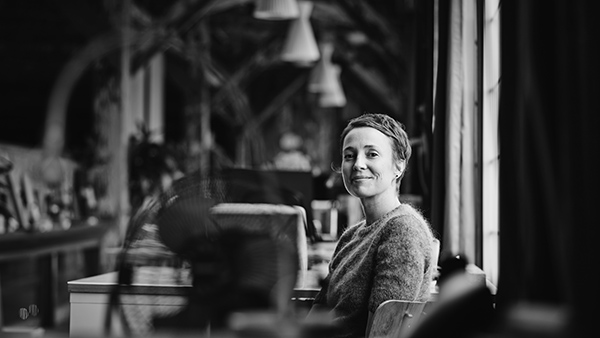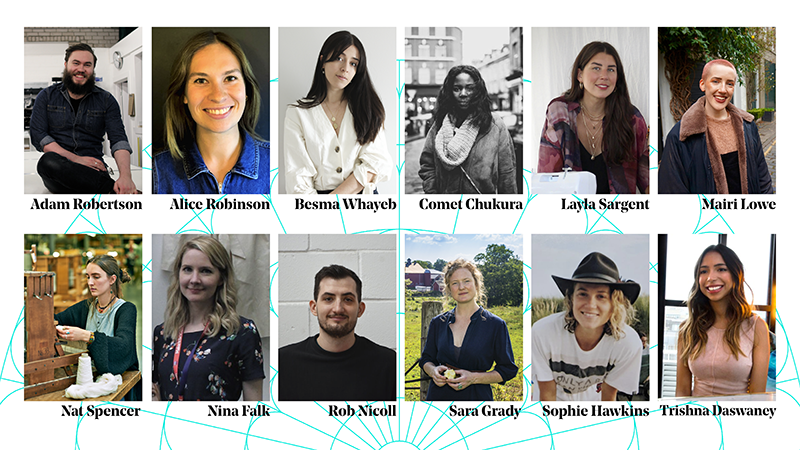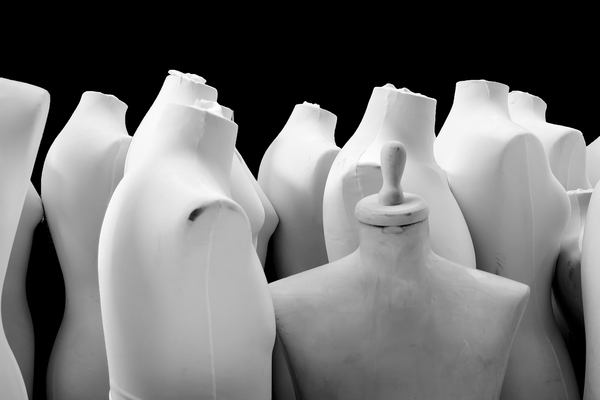FRSA David Brunnen argues that the nascent circular economy is too complex for legislation and that this would only kill the creativity driving it forward.
Where do you stand on this circular economy business? I only ask because lots of folks have very different perspectives. You may, of course, already have a really deep understanding of the circular economy. You may so completely understand the implications, the consequences, the urgency, the vital and inevitable necessity of this circularity that your head is already running riot with the possibilities. That this time around you will be right at the very centre of an enlightened renaissance.
Or maybe not.
And that is my point: mostly the advent of the circular economy is arriving unnoticed. Only in retrospect will many of us really understand how much things have changed. Occasionally eyebrows will be raised or incumbents complain about new market entrants, but very few of us will pull those threads together or notice how the texture of this year’s economic fabric seems less tightly woven.
Does that really matter? Evolutions are natural – the trumpets do not sound. These transformational ideas can take decades to dawn and are often fiercely resisted. Some sincere folks have yet to let go of Divine Intervention in favour of Newton’s ‘clockwork universe’. Considering the flaws of current mechanistic economic models, skepticism is perhaps understandable.
A new era for resource flows, finance and government?
Why is so much effort being expended? What drives those circular evangelists? What are the implications for public policy? Will reading this blog be worthwhile?
Circular economists contrast their world view with the prevailing orthodoxy – the linear economy. Conventionally, resources (inputs like minerals, crops, water, energy etc.) are used to grow or manufacture goods that are in turn consumed and then scrapped – but rarely, or not sufficiently, reused or recycled. In the context of exponential population growth there is an appetite for greater re-use of resources.
That familiar ‘make/use/dispose’ linear economy may not be so very straight – indeed some may see it, particularly after the last recession, as warped, bent, twisted or even crooked! Leaving aside pejorative dismissals, the notion of circularity is useful in, for example, describing goods that are designed to end their first life by being dismantled and reconstructed for yet another lifetime of use. ‘Made to be made again’ as the Ellen MacArthur Foundation would say.
But that basic notion implies a great change in attitudes to ownership. Do you buy the beast or merely buy the use of the beast? And if you only buy usage or performance do you really need so much capital? And if so much capital is not needed, will you no longer incur such great debt? And if debt were to go out of fashion, who needs lenders and how is investment motivated? Circularity implies a very deep reworking of resource flows and the age-old assumptions that underpin linear economies and public sector finances. And that, in turn, is but a small step away from questioning how we choose to be governed.
It is a mighty leap of mental agility to shift from ideas for efficient waste reduction to ‘a challenge for democracy’. The circular economy has, until recently, been filed away under ‘Green Things’. Most of the early examples cited ‘bio-mimicry’ - emulating natural biological recycling processes and transferring those concepts to manufacturing. The main driver was a concern for global depletion of scarce resources. But now circular economy concepts are spinning on a higher plane.
Enlightened complexity
This shift in air-time for circular economy evangelisation is in large part attributable to mathematics – or, more specifically, to newfound capabilities in complex modelling. Complex what? Is life not already complex enough? Well, yes. The issue is that we have not been very good at understanding that. Or rather, we have always known it but haven’t previously had the tools to explain just how complex our economic systems really are.
For sure, orthodox (linear) economics recognises that we don’t have anywhere near complete answers. All too often the best we could do was to wave our hands, mutter something about ‘externalities’ or indirect benefits - and then ignore them. In straightforward (some would say pragmatic) linear economics the overriding need for an actionable headline (or an election slogan) was about the best we could manage. Let someone else worry about cause, effect and consequences. No wonder economists sometimes refer to the ‘real economy’ – recognising for just fleeting seconds that their working approximations really are quite unreal. Hypothetically, not good enough.
New students of the circular economy on the other hand are getting their heads around the complexities of the real world. Not for them the presumed superiority of an approximately understood, supposedly free, supposedly ‘rational’, market where rationality is judged within a very limited set of approximations. Market concepts are not so much rejected but in need of deeper understanding and greater awareness of consequences.
Into this new, some would say more-enlightened, economic mix there’s room to explain all manner of (‘irrational’) disruptions that would confound conventional counting – crowd funding, the sharing economy, network impacts, open data and transparency, resilience, empowerments, municipal enterprise, collaborative advantage, and Mariana Mazzucato’s mission-oriented Entrepreneurial State. Below the froth you’ll find some interesting myth-busting impacts that go way beyond waste elimination:
- Will complex modelling mean that we will all become more sensitised to (previously unforeseen) consequences?
- Will policy developers and their governmental masters make fewer errors of ignorance?
- In this better-informed more collaborative and understanding world will we see the emergence of a new era of more-effective diplomacy?
- Will democratic voting systems be adapted to better reflect diversity of opinions?
The models and their maths may have become more complex but there are more easily understood ‘wheels within wheels’. Like quantum research, the more you discover (for example, the inner workings of a business process ‘ecosystem’) the more you can find to explore. circular economy ‘grand designs’ (macro models) have a great deal of lesser (micro) circularity embedded within them. These subsidiary loops are termed ‘flows’ by some and the complex modelling referenced earlier is the holistic (whole systems) observation of myriad components, their interactions and their cyclical synchronisations.
Evolution, not legislation
Economies, social norms and community cultures are always shifting and rebalancing, but never set in stone. In theory circularity should enable strong, faster, innovative endeavour.
But policy makers have raised the question of how to respond to a wholesale shift in economic thinking. Some fear that over hasty responses may stifle the evolution – enterprising organisations should be free to innovate. Market regulators seem to be increasingly under pressure from incumbents who would resist inconvenient disruption from new entrants. Moreover, the circular economy is not the only concept demanding air-time.
In reality the circular economy is happening – it doesn’t need to be mandated. The surest way to kill creativity is to legislate and regulate it when, by all accounts, the linear economy is being out-competed and those who don’t like it are already complaining to their favourite regulators. Just listen to the calls for restoration of ‘level playing fields’. Calls for stability? Sure, investors have this thing about risk – but there never were safe bets. Market chaos or licences to print money? Regulators will not go out of business any time soon – but they may need a top-down policy push (in national interests) to encourage fresh thinking.
In this more-circular economy, what really matters for individuals is not what they own but how they have access to and use of the available assets. In this more-rounded view of the economy the propositions must change from selling things to selling the performance of those things. It’s no wonder that semi-fibred asymmetric broadband propositions often fail to attract enthusiastic demand. Performance is judged by users in the context of their own needs and not according to some supplier’s wishful thinking script.
As I have already pointed out, circular economies are evolving. They really don’t need to be mandated:
Schiphol airport does not buy light bulbs: they buy ‘light as a service’ - the manufacturer retains ownership of the bulbs and eventually remanufactures them. The manufacturer is incentivized to minimize cost and maximize re-use of material and energy.
Why shred and dump your redundant hard disk drives to destroy the data when they can be degaussed and sent off to an Urban Mine to recover the rare earth minerals?
How many drills are sitting in sheds when they could be shared within the local community?
None of these things need government legislation or permission. With relevant digital platforms they are easy to manage. Who would defend ‘rights’ of car park owners against private householders making better use of their driveways
There may be inhibiting legislation that needs to be cleared away. Safeguards may be needed to prevent abuse or determine liabilities. New standards for safety and consumption may be required. But these minor roadblocks need not get in the way of wholesale fresh thinking. More fundamentally there’s a massive overhaul needed in education – particularly in economics and business studies – but already institutions are offering MBAs in circular economy studies
It does, of course, help to have great minds and a few great communicators working these things out. It will take decades for deep-set ideologically driven politicians to be replaced by new generations of fresh thinkers. The underlying logic of consuming less and conserving more will not disappear but for those who claim to be enlightened the circular economy opens so many innovative possibilities
So the world will keep spinning – maybe, perhaps, with a fraction less friction and a whole heap of new economic textbooks to study. Meanwhile we must learn to make best use of technological progress, gobble up fewer scarce resources, become more tolerant of diversity and even less clingy to old ideologies. But, in a more rounded world, we can become ever more inventive.
Related articles
-
-
Rethinking Fashion
Josie Warden Rebecca Ford
A 4-month learning journey with 12 creative ventures to accelerate the transition to a circular future for fashion.
-
4 ways Covid-19 will change the fashion industry
Josie Warden
Lockdown is changing shopping habits. The crisis could be a chance for positive change.




Be the first to write a comment
Comments
Please login to post a comment or reply
Don't have an account? Click here to register.